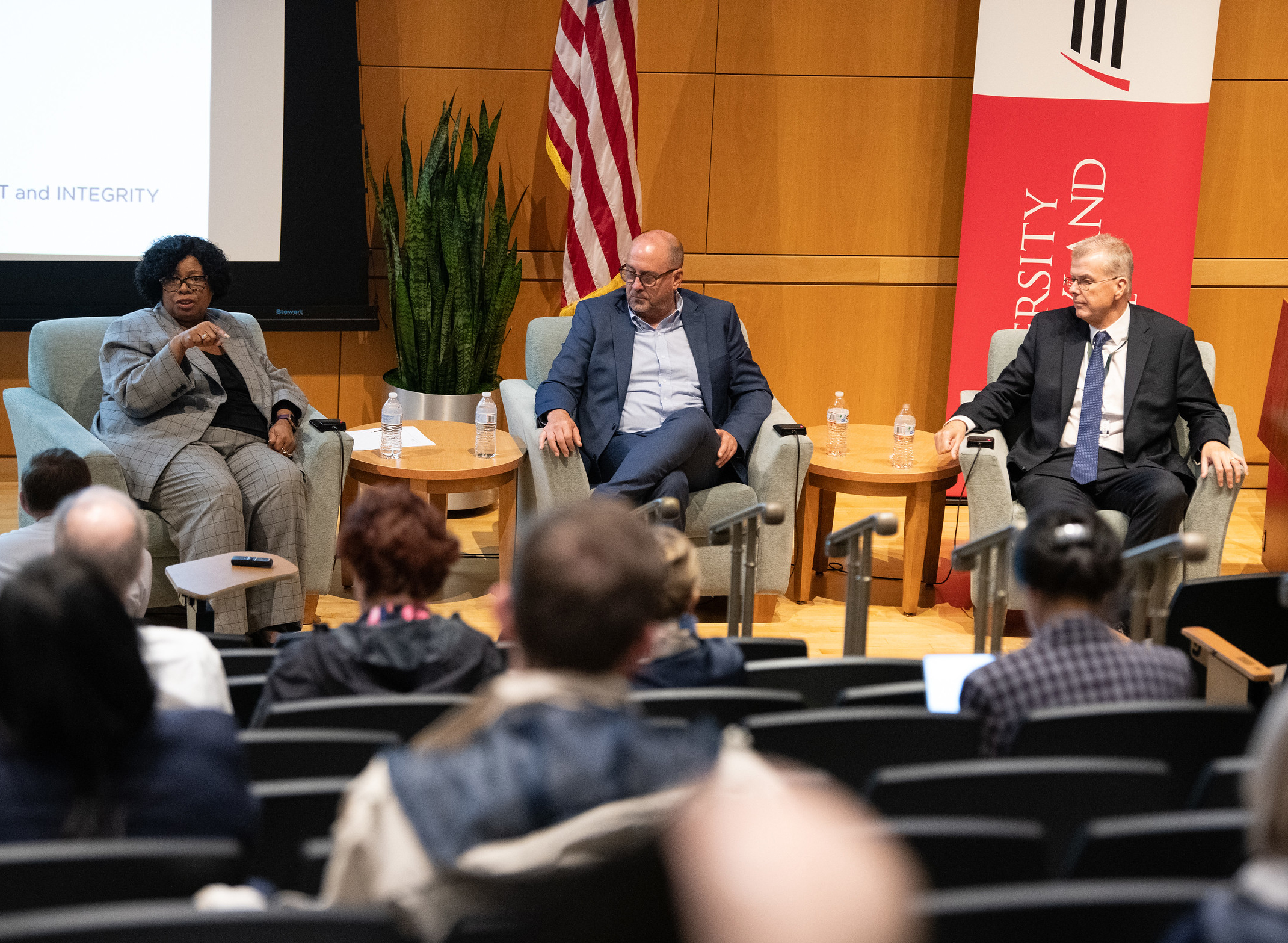UMB Leadership Hosts Second Annual Budget Town Hall
November 05, 2025 Dan Reed
Members of the University community are encouraged to watch a video of the event if they were unable to attend.
Photo: From left, Dawn Rhodes, Scott Bitner, and Kevin Donegan.
The University of Maryland, Baltimore (UMB) hosted its second annual Budget Town Hall on Oct. 30 at the School of Nursing Auditorium, offering attendees an overview of the University’s budget situation, the challenges UMB is facing, and the opportunity to interact with senior leadership. Like last year, the goals of the 60-minute session were to provide transparency about the budget-making process, give the audience an early look at the issues that might shape the Fiscal Year 2027 budget, and communicate that the University is financially healthy.
Speakers included President Bruce E. Jarrell, MD, FACS; Dawn M. Rhodes, DBA, chief business and finance officer and senior vice president; Scott Bitner, MBA, CPA, deputy chief financial officer and vice president, Finance and Auxiliary Services; and Kevin Donegan, MBA, assistant vice president, Budget and Financial Analysis.
(Watch a video of the UMB Budget Town Hall.)
Bitner began the presentation by outlining the annual budget timeline and defining many of the financial and budgetary terms they would be discussing. He followed with a discussion about the University’s fund balance, the financial functions of the fund, and why it’s important to continue growing the fund.
Donegan followed Bitner with a brief review of the 2025 financial metrics of UMB. Despite the challenges schools in the University System of Maryland (USM) are facing, he shared the USM financial dashboard that showed the system is meeting or exceeding almost all of its designated benchmarks, which is evidence of the University’s financial strength.
Rhodes spoke next, talking about state budgeting challenges and how turbulence at the federal government level could impact Maryland and UMB. She broke down UMB’s budget by division, by school, and how budget reductions from last fiscal year were handled.
Rhodes then offered a look at the possible budgeting challenges the University likely would face in FY27 and how it is preparing for them. At the same time, she stressed that while this kind of planning can be helpful, there are simply too many variables to draw any conclusions just yet.
A brief Q&A session followed. Like last year, several of the attendees’ questions focused on concerns about job security and compensation. Rhodes acknowledged these concerns, but stressed that it’s impossible to predict what might happen in FY27.
Rhodes ended the session on a positive note.
“We’re facing challenges, but I don’t know a time when higher ed wasn’t facing challenges of some sort,” she said. “We will weather this storm. We may look a little different, but we all need to stay focused on what our core mission is, which is improving the human condition. That is what we do best at this University, and we’re going to keep doing that no matter what.”
After the event, Rhodes urged everyone in the UMB community to watch the video of the event if they were unable to attend.
“It takes speculation out of the equation as our campus community thinks about our financial circumstances,” Rhodes said. “Most read articles and listen to the news and know how volatile our external environment is. All want to know how these things will affect them personally. It is incumbent on University leadership to be transparent, to share information that we know. Additionally, it’s important for the campus community to know that leadership is advocating on the University’s behalf and that we are developing mitigation plans.”
Jarell said these events are about helping the UMB community understand how the decisions are made. “Events like this are important because we make so many decisions, and we see so much data, that it’s important for other people to see it and understand why decisions get made,” he said.
Equally important is the transparency that these discussions — and the follow-up Q&A sessions —provide to the UMB community, Jarrell said.
“That’s what transparency is about, being able to see why decisions were made with what data. So, I hope attendees gain a better understanding of how we’re making decisions and that they have input into some of those decisions,” Jarrell said.
Bitner also stressed the importance of transparency. “I am proud of the level of transparency leadership provides to keep people informed. It is important for employees to understand that leadership is engaged and working to minimize the impacts of state reductions and decline in contracts and grants. We are all in this together, and the more we can be transparent, the more likely we will receive valuable input to help guide UMB decisions.”
Rhodes said she hopes attendees will take away that “UMB is financially healthy. It is our responsibility to plan for the financial health of the organization. That information is changing constantly in the current environment, and what we shared about FY26 and FY27 will change as the months pass. UMB leadership is committed to financial transparency with our campus community.”